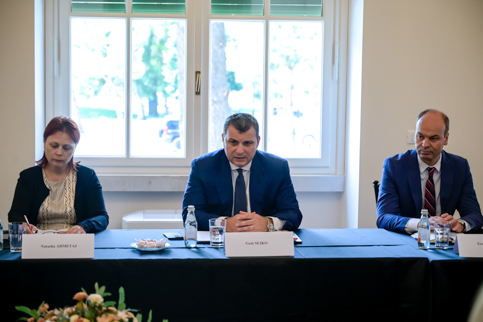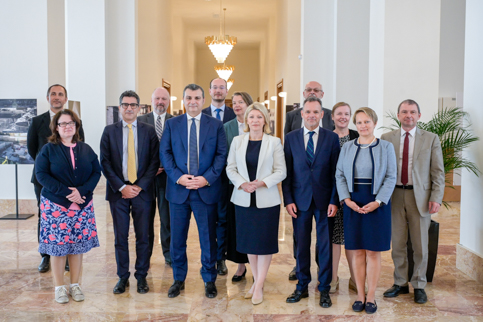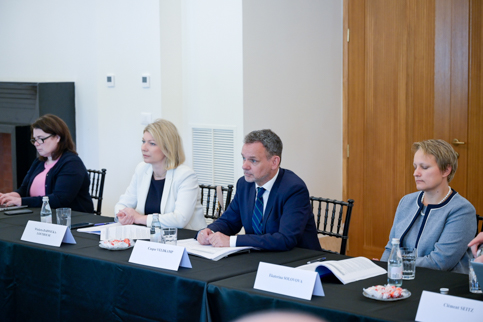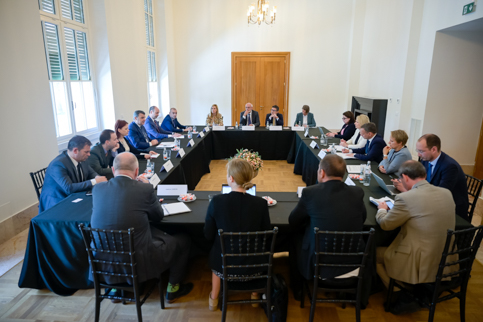BANK OF ALBANIA
PRESS RELEASE
Governor Sejko meets representatives of the European Bank for Reconstruction and Development
Publication date: 23.06.2023
On 23 June 2023, the Governor of the Bank of Albania, Mr Gent Sejko met with representatives of the European Bank for Reconstruction and Development’s (EBRD) Board of Directors chaired by Ms Wioletta Barwicka-Lofthouse, Regional Director for Poland, Bulgaria and Albania and Mr Caspar Veldkamp, Regional Director for the Netherlands, China, Mongolia, North Macedonia, Armenia, who was accompanied by Mr Matteo Colangeli, Director for the Western Balkans and Serbia and Ms Ekaterina Solovova, Head of the European Bank for Reconstruction and Development (EBRD) in Albania. The Second Deputy Governor of the Bank of Albania, Ms Natasha Ahmetaj as well as other representatives from the Bank of Albania attended this meeting.

The Board of Directors is visiting Albania in the framework of the EBRD's five-year strategy and future priorities for the Balkan region and Albania.

At the beginning, the Governor of the Bank of Albania, Mr Gent Sejko commended the excellent relations of our country with the EBRD. He thanked the EBRD for the important contribution it has given to Albania as one of the largest institutional investors and in particular to the Bank of Albania. Very important projects for the banking system have been achieved thanks to this contribution. "The cooperation with this institution remains of high importance, for the concrete support with financial investments, the seriousness of the projects and its transformation." - said the Governor.

The Governor emphasized that Albania has significantly progressed regarding the economic development, by increasing competitiveness and expanding reforms, especially in the field of digitalization. The Albanian economy, despite the successive shocks, has continued to grow at a stable pace, by 4.8% in 2022.
This growth has been underpinned by the continuous expansion in the activity across the sectors of: construction, industry and services. These sectors benefited from the rapid and ongoing increase in tourism income.
The Bank of Albania’s forecasts for 2023 remain positive for both the economic growth and the fall of inflation. Inflation will continue to gradually decline in 2023 and return to its target during 2024 H1. The monetary policy stance implemented by the Bank of Albania has provided the necessary conditions to safeguard its price stability objective in the medium term, while paying attention to minimise its impact on containing the economic activity, and potential adverse consequences on financial stability.
Regarding the banking sector, the Governor said that this sector has steadily continued its activity, with adequate levels of profitability, improved credit quality and controlled exposure to risk. The stress tests that the Bank of Albania continuously conducts, show that the banking sector is resilient to possible macroeconomic shocks and maintains a strong liquidity position.
Meanwhile, as a key institution in the country's European integration process, the Bank of Albania has actively contributed to this process, by successfully fulfilling its institutional obligations related with this process. With the opening of negotiations in July of 2022, the Bank of Albania has intensified its activation and contribution to bilateral meetings with the European Commission, while continuing the economic and financial dialogue through participation in joint committees with the European market authorities.

The representatives of the Board of Directors of the EBRD appreciated the cooperation with the Bank of Albania, as a reliable partner that has provided added value for the successful implementation of the EBRD projects in the banking field. The Bank of Albania has proved to be a central bank that is capable of acting proactively to preserve the macroeconomic and financial stability of the country.
In this meeting with the Governor, they were interested in issues related to the transmission of monetary policy in the economy, the modernization of payment systems, the European integration process and the use of the euro in Albania.
Concluding, the representatives of the Board of Directors expressed the EBRD's commitment to continue supporting Albania in the development of the private sector through investments, policy dialogue, technical assistance and business advice. This commitment will help shape initiatives that create favourable conditions for sustainable and inclusive economic growth.

 Linkedin
Linkedin
 Twitter
Twitter
 Youtube
Youtube
 Facebook
Facebook
 Flickr
Flickr
 RSS
RSS
 Subscribe
Subscribe
 Feedback
Feedback